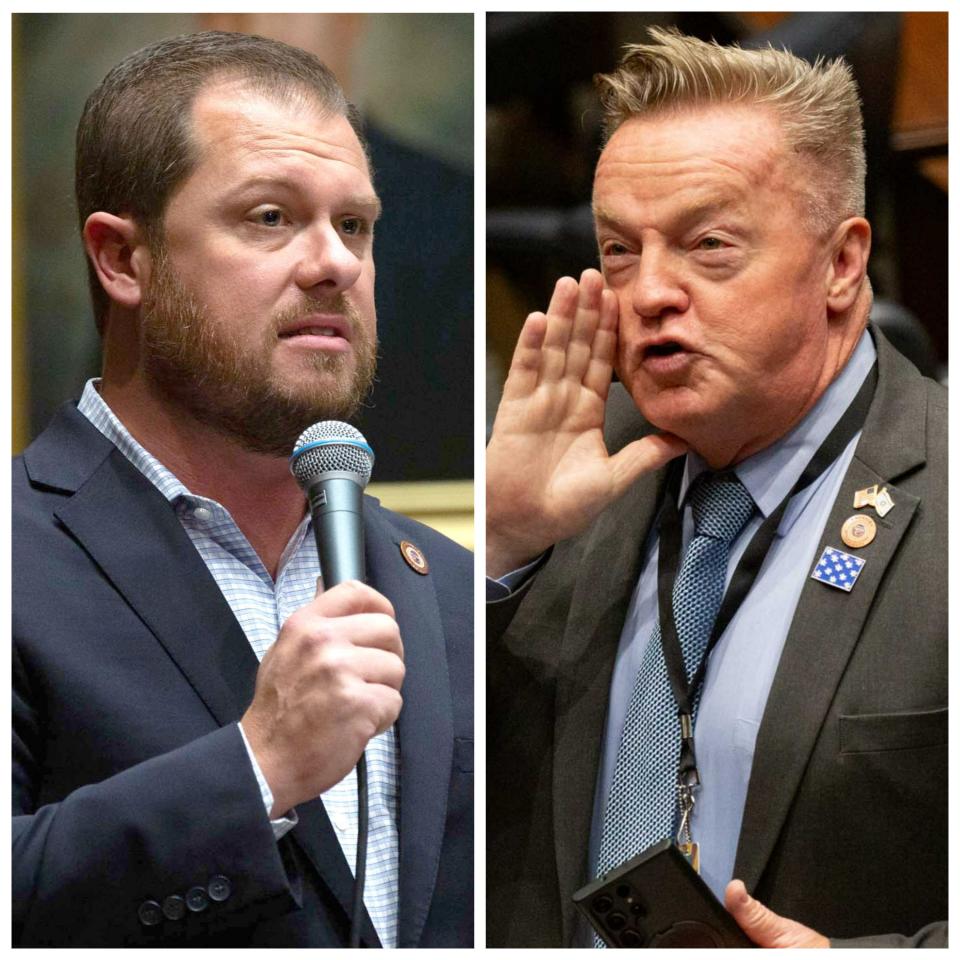2 Republican lawmakers indicted in Arizona fake electors case. Can they continue to serve?
Two Arizona state senators were indicted this week related to their claims to be legitimate electors four years ago in what a grand jury alleges was a coordinated effort to keep former President Donald Trump in power.
They are not required by Arizona law to resign their elected offices because of the indictment, though history shows some public officials have chosen to do so facing public pressure — and hoping to avoid negative attention.
Arizona law says elected officials must step aside after a conviction. Specifically, an elected office “shall be deemed vacant” if there is a conviction “of a felony or an offense involving a violation of the person's official duties.”
Sen. Jake Hoffman, R-Queen Creek, and Sen. Anthony Kern, R-Glendale, were each charged with nine felony counts including conspiracy and forgery. Arizona Attorney General Kris Mayes, a Democrat, announced the grand jury indictment on Wednesday after a roughly yearlong investigation.
The indictments: Grand jury indicts fake electors who falsely certified Donald Trump as 2020 winner in Arizona
Kern has not commented on the indictment.
But Hoffman said he was innocent and alleged Mayes timed the case to harm her political opponents.
"Kris Mayes' sham political witch hunt will not have any impact on my service to the people of my district and this state," he said in a text message. "I am innocent of any crime, and will fight these politically motivated charges vigorously."

Public scrutiny and pending charges may not be a motivating factor for either lawmaker to step down. Both are candidates for office and may be counting on a loyal Republican base that may see the prosecutions as politically motivated.
Kern and Hoffman had already sought to send that message about Mayes’ case before the indictment was issued.
Late last month, Kern delivered a campaign speech that echoed rhetoric of Trump’s bid to return to the White House. He cast himself as the victim of “weaponization of our government” that was fueled by Democratic state leaders trying to bankrupt him and keep him from Congress. Kern is seeking the GOP nomination in a crowded primary to represent Arizona’s Congressional District 8.
Likewise, Hoffman, who is running for another two-year term in the state Senate and for a seat on the Republican National Committee, had accused Mayes and the U.S. Department of Justice, which is prosecuting Trump, of corruption. He claimed they are seeking to “persecute their political enemies, and it’s reprehensible.”
Neither has meaningfully answered questions from The Arizona Republic about why they signed documents in December 2020 falsely claiming to be legitimate electors from Arizona.
Arizona’s votes in the Electoral College by law go to the presidential candidate who wins the popular vote. The people who cast the votes — the electors — take an oath and sign certificates for the office of president and vice president, which are sent to the U.S. Senate and National Archives.
Congress then meets on Jan. 6 to tally those votes. That date was routine until 2021, when protesters fueled by Trump’s false claims that he won the race breached the U.S. Capitol. Congress convened early the next morning to finish its work, discounting the slates of Trump electors and certifying Democrat Joe Biden’s win.
Hoffman’s charges are noteworthy in part because of the immense political power he commands through committee assignments and his role as founder of the Arizona Freedom Caucus. The caucus is the coalition of both the House and Senate’s most conservative members.
But Hoffman and Kern are not the only sitting lawmakers to face indictment in Arizona in recent years.
State Sen. Otoniel "Tony" Navarrete, D-Phoenix, was arrested in August 2021 on charges he had sexual conduct with two teenagers. He resigned a few days later, and was in February found guilty of one count of sexual conduct with a minor.
Rep. Ceci Velasquez, D-Litchfield Park, was indicted in 2016 on charges of welfare fraud involving the Supplemental Nutritional Assistance Program, commonly called food stamps. Velasquez pleaded guilty to one count and was put on a year's probation, The Arizona Republic previously reported. Velasquez did not resign, but said while the case was pending that she would not seek reelection.
Going deeper into the history books, Republican Gov. Fife Symington stuck it out in office while facing criminal charges alleging he defrauded lenders to his real estate business. He was forced to resign after being convicted of making false financial statements in 1997.
Other lawmakers have resigned while facing the Legislature’s ethics investigation process, which can lead to an expulsion vote.
Reach reporter Stacey Barchenger at [email protected] or 480-416-5669.
This article originally appeared on Arizona Republic: Arizona fake electors: Can indicted GOP lawmakers continue serving?